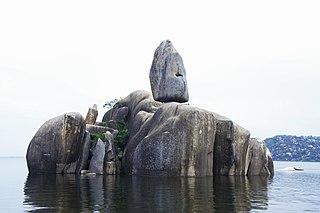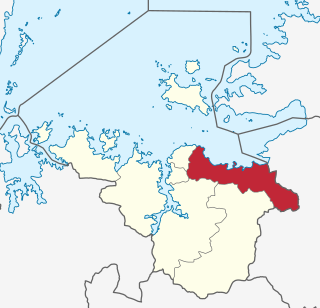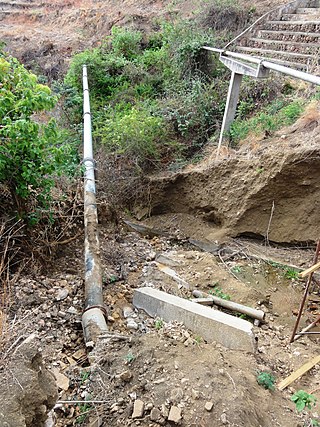Transport in Tanzania includes road, rail, air and maritime networks. The road network is 86,472 kilometres (53,731 mi) long, of which 12,786 kilometres (7,945 mi) is classified as trunk road and 21,105 kilometres (13,114 mi) as regional road. The rail network consists of 3,682 kilometres (2,288 mi) of track. Commuter rail service is in Dar es Salaam only. There are 28 airports, with Julius Nyerere International being the largest and the busiest. Ferries connect Mainland Tanzania with the islands of Zanzibar. Several other ferries are active on the countries' rivers and lakes.
Danish Committee for Aid to Afghan Refugees (DACAAR)(Danish: Den danske komité for hjælp til afghanske flygtninge) is a non-political, non-governmental, non-profit humanitarian and development organization working to improve the lives of the Afghan people since 1984.

Mwanza City, also known as Rock City to the residents, is a port city and capital of Mwanza Region on the southern shore of Lake Victoria in north-western Tanzania. With an urban population of 1,182,000 in 2021, it is Tanzania's second largest city, after Dar es Salaam. It is also the second largest city in the Lake Victoria basin after Kampala, Uganda and ahead of Kisumu, Kenya at least in population size. Within the East African community, Mwanza city is the fifth largest city after Dar, Nairobi, Mombasa, and Kampala. It is slightly ahead of Kigali, Kisumu, and Bujumbura in the population of city proper limits. However, in terms of infrastructure, Kigali and Kisumu cities are way ahead of Mwanza. Mwanza city is also the capital city of Mwanza Region, and is administratively divided into two municipal districts within that Region - Ilemela and Nyamagana.

Bunda is one of the seven districts of Mara Region in the United Republic of Tanzania, East Africa. It is bordered to the north by the Musoma Rural District and Butiama District, to the east by Serengeti District, to the south by Bariadi District and Busega District, and to the west by Lake Victoria. The district administration town is also called Bunda, located on the north-south trans-national all tarmac highway from Kenya to Zambia via Tarime and the lakeside municipalities of Musoma, Mwanza, and thereon to Mbeya in southern Tanzania. The district has four divisions: Kenkombyo, Nansimo, Serengeti and Chamuriho.

Mwanza Region is one of Tanzania's 31 administrative regions The regional capital is the city of Mwanza. Mwanza Region is home to Ukerewe Island, the largest lake island in Africa as well as Saanane Island National Park, the smallest national park in Tanzania.

Misungwi District is one of the seven districts of the Mwanza Region of Tanzania. It is bordered to the north by Nyamagana District and Magu District, to the east by Kwimba District, to the south by Shinyanga Rural District and to the west by Nyang'hwale District and Lake Victoria. Misungwi is often spelled with an extra 's' to make it Missungwi. The administrative centre is in the town of Misungwi.

Magu District is one of the seven districts of the Mwanza Region of Tanzania, East Africa. Its administrative centre is the town of Magu on the Simiyu River. It is bordered to the north by Lake Victoria and Busega District, to the east by Bariadi District, to the south by Itilima District, Maswa District, Kwimba District and Misungwi District, and to the west by the city of Mwanza, which consists of Nyamagana District and Ilemela District.

Raphael Msunga Chegeni is a Member of Parliament in the National Assembly of Tanzania.

The developing nations of Africa are popular locations for the application of renewable energy technology. Currently, many nations already have small-scale solar, wind, and geothermal devices in operation providing energy to urban and rural populations. These types of energy production are especially useful in remote locations because of the excessive cost of transporting electricity from large-scale power plants. The applications of renewable energy technology has the potential to alleviate many of the problems that face Africans every day, especially if done in a sustainable manner that prioritizes human rights.
The Bremen Overseas Research and Development Association (BORDA) is a non-profit international development organization headquartered in Bremen, Germany, and regional offices in Afghanistan, India, Indonesia, Mexico, and Tanzania as well as several project offices within each region. BORDA began its work in 1977, starting with its first project, “Technology Transfer of Biogas India-Ethiopia.” Since then it has been active in the delivery of basic needs services across the developing world.

The Ugandan water supply and sanitation sector made substantial progress in urban areas from the mid-1990s until at least 2006, with substantial increases in coverage as well as in operational and commercial performance. Sector reforms from 1998 to 2003 included the commercialization and modernization of the National Water and Sewerage Corporation (NWSC) operating in cities and larger towns, as well as decentralization and private sector participation in small towns.

Tanzania Ports Authority (TPA) is a parastatal public corporation acting under the aegis of the Ministry of Infrastructure Development, that has the responsibility "to manage and operate" the ocean ports and lake ports of the country of Tanzania. The Tanzania Ports Authrorty headquarters are located in Kurasini Dar es Salaam. It is a member of the Port Management Association of Eastern and Southern Africa.

Water supply and sanitation in Tanzania is characterised by: decreasing access to at least basic water sources in the 2000s, steady access to some form of sanitation, intermittent water supply and generally low quality of service. Many utilities are barely able to cover their operation and maintenance costs through revenues due to low tariffs and poor efficiency. There are significant regional differences and the best performing utilities are Arusha and Tanga.
Guatemala faces substantial resource and institutional challenges in successfully managing its national water resources. Deforestation is increasing as the global demand for timber exerts pressure on the forests of Guatemala. Soil erosion, runoff, and sedimentation of surface water is a result of deforestation from development of urban centers, agriculture needs, and conflicting land and water use planning. Sectors within industry are also growing and the prevalence of untreated effluents entering waterways and aquifers has grown alongside.
Emmanuel International Canada is a non-governmental, non-profit, evangelical Christian relief organization whose purpose is to strengthen and assist local churches in developing countries to holistically meet the social, physical, emotional, and spiritual needs of their communities.
Tanzania, officially known as the United Republic of Tanzania, is a mid-sized country in southeastern Africa bordering the Indian Ocean. It is home to a population of about 43.1 million people. Since gaining its independence from the United Kingdom in 1961, Tanzania has been continuously developing in terms of its economy and modern industry. However, the country’s economic success has been limited. Environmental obstacles, such as the mismanagement of natural resources and industrial waste, have been contributing factors and results of the relatively low economic status of the country. Tanzania’s annual output still falls below the average world GDP. In 2010, the GDP for Tanzania was US $23.3 billion and the GDP per capita was US $1,515. Comparatively, the GDP for the United States was $15.1 trillion and the GDP per capita was approximately $47,153. Eighty percent of the workers accounting for this annual output in Tanzania work in agriculture, while the remaining 20% work in industry, commerce, and government organizations. Such a heavy reliance on agriculture has placed a huge amount of strain on an already limited supply of viable land.

Busega District is one of the five districts of Simiyu Region of Tanzania, East Africa. Its administrative centre is the town of Nyashimo. It is bordered to the north by Lake Victoria and Bunda District, to the east by Bariadi District, and to the south by Magu District.

Failures of water supply and sanitation systems describe situations where water supply and sanitation systems have been put in place (for example by the government or by non-government organizations but have failed to meet the expected outcomes. Often this is due to poor planning, lack of choice of appropriate technology depending upon the context, insufficient stakeholder involvement at the various stages of the project and lack of maintenance. While Hygiene Behavior Change is important in achieving the health benefits of improved WASH systems, the achievement of sustainability of WASH infrastructure depends on creation of demand for sanitation services.

The Turkish Cooperation and Coordination Agency is a government department subordinate to the Ministry of Culture and Tourism (Turkey). Focusing on development cooperation, TİKA works in more than 150 countries. TİKA is responsible for the organization of the bulk of Turkey's official development assistance to developing countries, with a particular focus on Turkic and African countries and communities. According to the OECD, 2020 official development assistance from Turkey increased by 1.2% to US$8 billion. As of January 2022, TİKA has undertaken 30,000 projects worldwide.

Kijereshi Game Reserve is a protected area in Tanzania.














